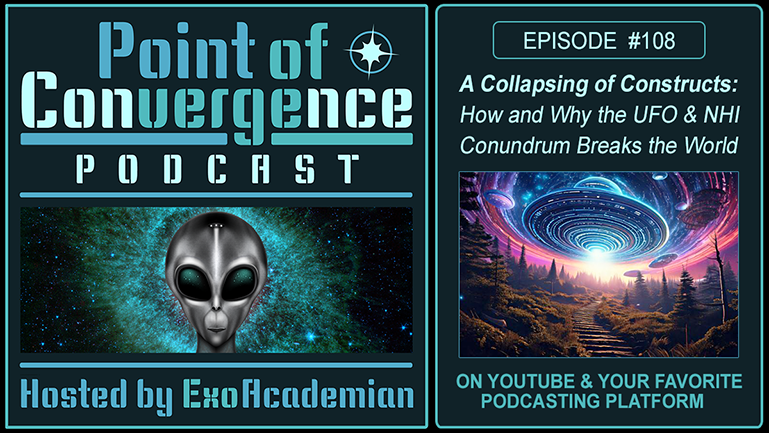As our society begins to host dinner-table conversations around the reality of non-human intelligences co-occupying our space here on and around planet Earth, certain assumptions are inevitably being applied before even a single word is spoken. On previous episodes of this podcast we’ve discussed how the notion that these beings are extraterrestrials, that is to say – “space aliens” – has been one of the most frequent assumptions applied.
Even today, that continues to be the case, because the other origin hypotheses that had been floated; namely interdimensional, extradimensional/celestial, cryptoterrestrial, ultraterrestrial, extratempestrial, etc, are really only being bandied about within the dedicated ufological community. We (those who are part of that community, that is) know, of course, that it is the data themselves that lead people to these other possibilities; but Joe and Jane Public just are not there yet. They’re still parsing along the lines of the headline grabbing: “we’re not alone, and they’re here!”
As it turns out, though, that pre-assigned notion as to origins is just one of a whole host of assumptions regularly being applied to this matter of the UFO Phenomenon. And again, for those of us intimately familiar with this topic, we know full well that the many of the other assumptions being applied are equally as either questionable, or fully outdated, in light of the decades–and many would argue, even centuries or even millennia-long–data at our disposal.
While those who’ve been in this field the longest–the true “lifers”–if you will, are no doubt cheering the entrance of mainstream academia into the mix in recent years, I would caution that this segment of our society is bringing its own set of pre-existing assumptions to the table as well.
And, again, some of those assumptions just don’t play well with this data. And in our race for conventional recognition, we should be careful to not sell the process short, because academia, too, will have its understanding stretched (to say the very least) by the nature of this data.
This same is true for religious adherents of one form or another. The fact that this data does seem to include what we might call “spiritual overtones” often leads this religiously-affiliated segment of our civilization to the conclusion that this puts the UFO Phenomenon data firmly in their worldview camp, leading them to gleefully proclaim that this shows that they’ve been “right all along”. In both these cases (for those academically and/or religiously inclined), the problem arises in their assumption that the interpretive grid they have at their disposal is generally sufficient to make sense of this anomalous data, and that all they need to do now is slot various data points into various categories of pre-agreed meaning.
Simply put, that will not work. I tend to agree with Peter Levenda’s contention here, suggesting that what this data really asks us to do is consider our reality models from the perspective of the Phenomenon, and not the other way around. The question then becomes: as we do this, just how far afield will this take us? And what elements of our various pre-existing conceptual models will be left standing when we’re done?
And what alternatives might we tentatively put in their place? And these are precisely the issues we’ll seek to engage with in this, the 108th episode of the Point of Convergence podcast.


 107 ~ Of Expansion & Ascension
107 ~ Of Expansion & Ascension